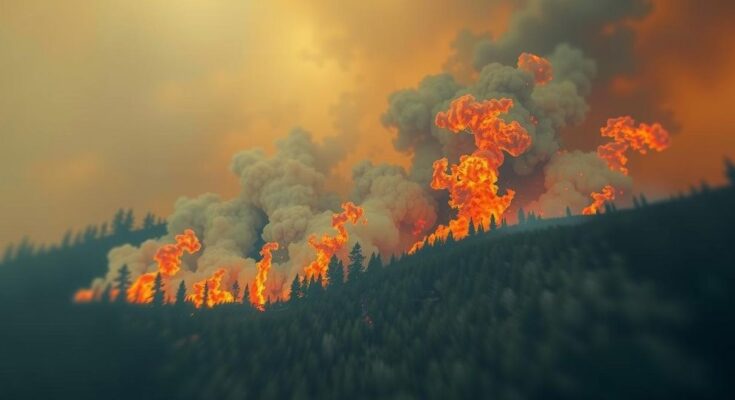New research suggests that smoke pollution from wildfires is responsible for an additional 12,000 deaths annually, driven by climate change and rising wildfire occurrences. Global heating is increasing risks predominantly in Australia, South America, Europe, and Asia. Despite mitigating actions that reduce burned areas, the health implications of PM2.5 from wildfires remain significant, adversely affecting millions.
Recent research indicates that smoke pollution resulting from wildfires may contribute to an additional 12,000 fatalities annually, primarily due to the inhalation of hazardous particulate matter (PM2.5). This phenomenon is exacerbated by global heating, which has been linked to an increase in wildfire frequency and intensity across multiple regions including Australia, South America, Europe, and boreal forests in Asia. A significant study spearheaded by Dr. Chae Yeon Park from the National Institute for Environmental Studies in Japan reported that nearly 100,000 individuals succumb annually to complications arising from smoke inhalation. This finding is underscored by another study which documented a 16% rise in fire-affected areas globally from 2003 to 2019 due to climate change, despite a 19% reduction attributed to human activities such as deforestation for agricultural and infrastructural development. Both studies published in “/Nature Climate Change/” meticulously delineated the disparate impacts of greenhouse gas emissions relative to human-induced land modifications. Researchers employed three models based on current climate conditions and juxtaposed them against a scenario devoid of modern climate change effects. The consistent outcome across the board affirmed that global heating correlates with an increasing mortality rate due to PM2.5 exposure from wildfires. The different climatic factors influencing fire risks showcase a complex interplay between rising temperatures and decreased humidity in various regions. Moreover, scholars argued that health implications arising from wildfires are likely underestimated, emphasizing that the toxicity of particles from combustion is notably more detrimental than that of particulate matter from other origins. Professor Hilary Bambrick, a prominent figure at the National Centre for Epidemiology and Population Health at the Australian National University, highlighted the prolonged and dangerous levels of smoke pollution encountered by Australians during the catastrophic fires of 2019 and 2020, asserting, “This resulted in hundreds of deaths at the time, and will likely have long-term health consequences for many.” The studies also echo concerns regarding escalating wildfire risks due to climate change in regions, including Australia and Siberia, while acknowledging that human interventions have paradoxically limited the overall area affected by fires. Nevertheless, the enfeebling impact of climate change on wildfires continues to mount annually.
The ongoing global climate crisis is intensifying the frequency and severity of wildfires, presenting significant public health risks. Smoke from wildfires contains particulate matter, specifically PM2.5, which is capable of penetrating lung tissues and entering the bloodstream, leading to serious health issues and increased mortality rates. Understanding the health impacts of wildfire smoke in the context of climate change is crucial, as it aids governments and health officials in planning and implementing effective mitigation strategies. The findings from the two studies provide vital insights into how environmental changes driven by global heating are fundamentally altering the dynamics of wildfire occurrence and severity, thereby complicating public health outcomes.
In summary, the research underscores a severe public health threat posed by the increasing prevalence of wildfires as a consequence of global heating, particularly through the harmful effects of inhaled PM2.5. The correlation between climate change and rising deaths due to wildfire smoke necessitates increased efforts for both immediate mitigation strategies and long-term climate action to safeguard public health. Awareness of these impacts is essential for formulating effective responses to the emerging crisis of wildfire smoke pollution.
Original Source: www.theguardian.com




